Hard Sole Shoes for Babies – Are They the Right Choice for Your First Walker?
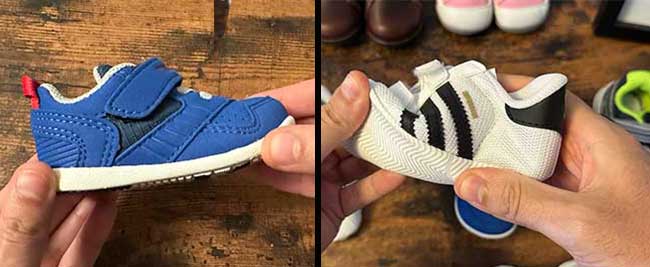
Wondering if your baby needs hard sole shoes? It’s a common question I get from parents at the children’s shoe store where I work. Pediatricians and podiatrists agree—babies should go barefoot as much as possible to strengthen their feet and develop a natural walking pattern. However, once your baby is walking confidently and needs protection outdoors or on rough surfaces, hard sole shoes become essential. In this article, I’ll guide you on when and how to introduce hard sole shoes to support your baby’s healthy foot development.
Soft Sole Shoes vs Hard Sole Shoes – Choose Them Wisely!
If you ask pediatricians or physical therapists about the best shoes for a baby learning to walk, you’ll likely hear two schools of thought. Some experts recommend soft soles to encourage natural movement, while others support slightly firmer soles for added stability and protection.
Soft Sole Shoes for Babies: Best for Learning How to Walk
Soft sole shoes are often recommended for babies who are just beginning to walk. These shoes are made from flexible materials, usually leather or fabric, and have a soft, pliable sole. The softness allows the shoe to move with the baby’s foot, mimicking the barefoot experience while providing a layer of protection. This flexibility is crucial as it supports the natural movement of the foot, allowing the toes to grip and flex as needed.
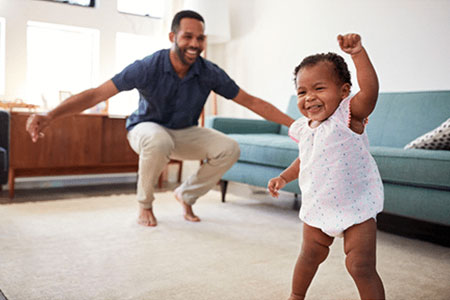
Hard Sole Shoes for Babies: Best If Already Walking Confidently
Once your baby has gained confidence in walking, you might consider transitioning to hard sole shoes. These shoes offer more substantial support and protection, making them suitable for outdoor use and on uneven surfaces. The sturdy construction of hard sole shoes provides a solid base that can withstand the elements, protecting your child’s feet from sharp objects and harsh weather conditions.

Do Most Babies Have Wide Feet?
An important consideration when selecting shoes is whether your baby has wide feet. Babies often have wider feet due to the natural spread of their toes, which helps them balance. The broadness of their feet is a natural adaptation that supports their early attempts at standing and walking. When choosing shoes, it’s essential to account for this width to ensure a comfortable fit that accommodates their natural foot shape.
Keep in mind, I don’t recommend hard sole shoes for babies who are just learning to walk, as they can make the process more difficult. Early walkers often lack the strength to bend stiff soles. While hard soles are great for confident walkers who need more support, soft sole shoes are better suited for early walking stages.
Best Hard Sole Shoes for Babies Who Are Already Walking
As we look ahead to 2025, several shoe brands have emerged as top choices for baby walking shoes. Here are my recommendations based on quality, comfort, and design.
1. Merrell Kids’ Bare Steps Sneaker
These Merrell hard sole shoes for babies are designed with a wide toe box and a lightweight and flexible base, encouraging natural foot development.
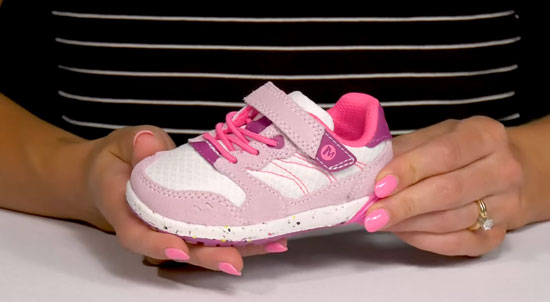
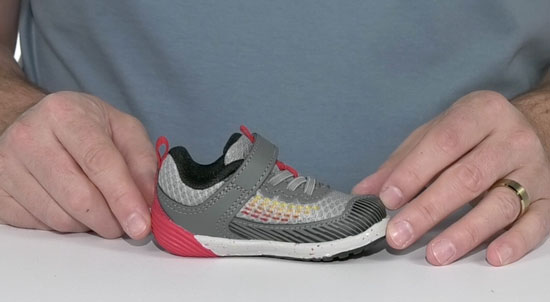
Key Features
- Order the shoe Bare Steps by Merrell on Amazon or Zappos
- Not available in wide or extra wide widths but fits naturally wide
- Awarded the Seal of Acceptance from the American Podiatric Medical Association (APMA)
- Padded tongue and collar for added comfort
- I suggest that you get this shoe a whole size larger than your toddler’s current foot size
2. Shoe Style Thompson by Stride Rite
These hard sole baby shoes feature a flexible sole and a rounded toe design to support natural movement, making them a favorite among parents and podiatrists alike.
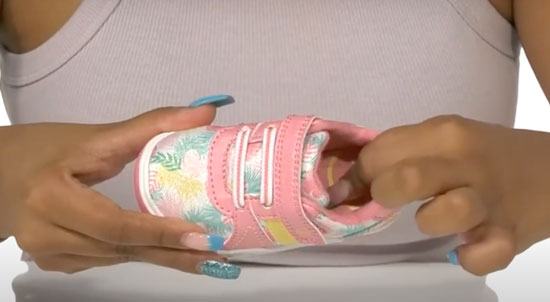
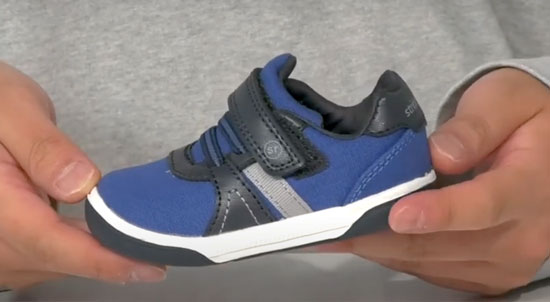
Key Features
- Order the shoe Thompson Sneaker on Amazon
- Available in wide widths
- Awarded the Seal of Acceptance from the American Podiatric Medical Association (APMA)
- Padded tongue and collar for added comfort
- Breathable textile lining and cushioned insole
- I suggest that you get this shoe a whole size larger than your toddler’s current foot size
3. Shoe Style Racer by Tsukihoshi
These Tsukihoshi hard sole walking shoes for babies are lightweight, flexible, and capable of accommodating babies with wide feet and high insteps.
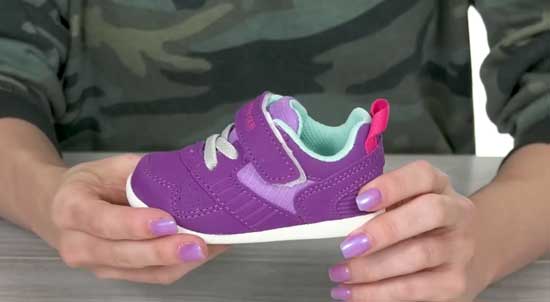
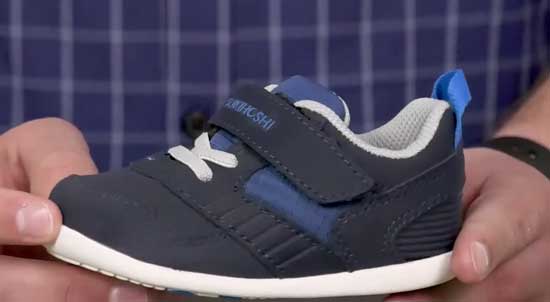
Key Features
- Order the shoe Artie and Adalyn by Stride Rite on Amazon or Zappos
- Rounded edges to decrease stumbles and falls
- Available in wide and extra wide widths
- I suggest that you get this shoe a whole size larger than your child’s current foot size
4. Shoe Style Elliott by Stride Rite
These Stride Rite booties for babies offer a stable base of support and a comfortable fit, making them a top choice for babies who are already walking.
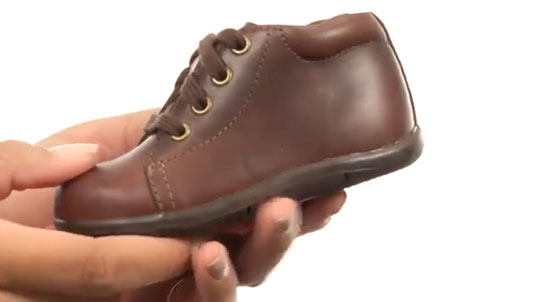
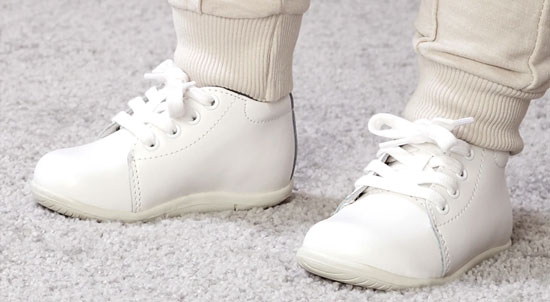
Key Features
- Order the shoe SRT Elliot by Stride Rite on Amazon or Zappos
- Available in wide and extra wide widths
- 100% leather made
- I suggest getting this shoe a whole size larger than your toddler’s current foot size
5. Shoe Style Casey by See Kai Run
These See Kai Run booties provide extra depth, rounded toe-boxes, and opens up nice and wide for easy on and off.
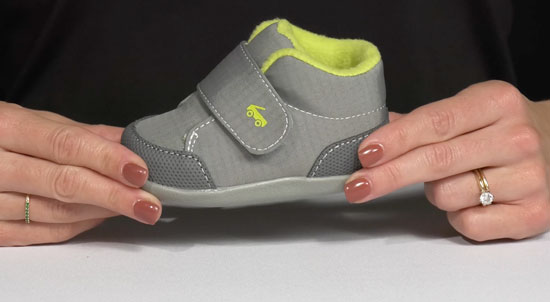
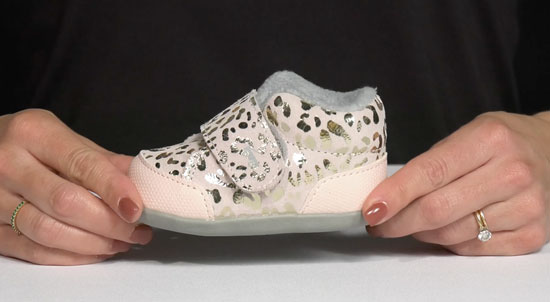
Key Features
- Order the shoe Casey by See Kai Run on Amazon or Zappos
- Not available in wide or extra wide widths but fits naturally wide
- Awarded the Seal of Acceptance from the American Podiatric Medical Association (APMA)
- Fleece lining for extra warmth
- I suggest that you get this shoe a whole size larger than your toddler’s current foot size
It’s crucial to ensure that the shoe fits well and does not restrict the natural movement of the foot. Disclosure: Keep in mind that we may receive commissions when you click our links and make purchases.
How to Retrieve Your Baby’s Exact Foot Length and Shape
As a shoe fitter, I recommend measuring your baby’s feet regularly, as their foot size and shape can change rapidly. This ensures that you select the correct size and width for optimal comfort and support. A well-fitted shoe can prevent issues like blisters, calluses, and improper gait development, making it a crucial aspect of your child’s footwear. My virtual shoe fitting service is user-friendly and designed to ensure you select the perfect pair of shoes, minimizing the hassle of returns and exchanges.
The Importance of Wearing Socks
Socks play a crucial role in maintaining foot health for babies. They provide an extra layer of warmth and protection, help absorb moisture, and reduce friction between the foot and shoe, preventing blisters. The right pair of socks can make a significant difference in your child’s comfort and overall foot hygiene, especially in active and outdoor settings.
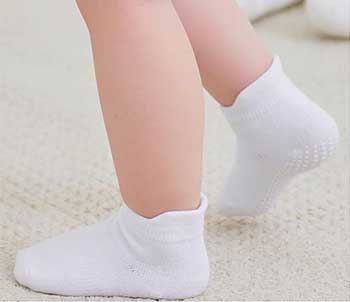
- Order these socks made by Zaples on Amazon
- Strong grips at the bottom cover the whole foot from heel to toe
- The pull tabs behind the ankle help the mom to put on and take off the socks very easily
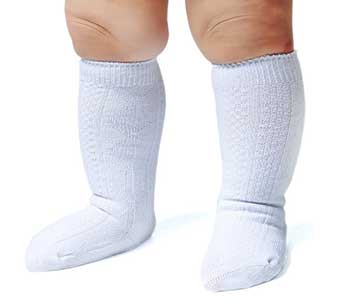
- Order these socks made by Epeius on Amazon
- 76% combed cotton, 21% polyester and 3% spandex
- Seamless cable/ribbed knit knee high socks for babies
- Breathable
- Machine wash
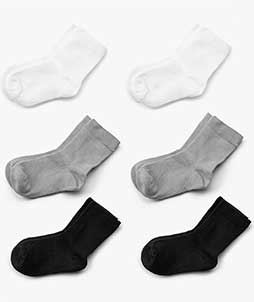
- Order these socks made by SilkyToes on Amazon
- 80% Rayon from Bamboo, 10% Polyester, 5% Nylon, 5% Spandex
- Cushioned sole to keep your child’s feet comfortable
- Machine wash
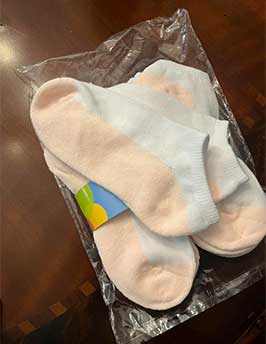
- Order these socks made by Jefferies on Amazon
- Smooth toe seam provides less irritation and bulk for sensitive toes and feet
- Made with premium ultra soft cotton
- Quarter ribbed stay-up top is extra comfortable around the ankles
Reach Out for Specific Baby Shoe Recommendations
Selecting the right shoes for your baby is more than just choosing a style you like. It’s about finding the right fit that supports their development and provides comfort. Every baby is unique, and their shoes should reflect their individual needs. As a passionate shoe fitter, I’m here to assist you with tailored recommendations based on your baby’s specific needs. Please don’t hesitate to reach out if you have any questions or need further guidance in choosing the best shoes for your little one.
Should You Allow Your Baby to Walk Barefoot?
Babies learn how to take their first steps by gripping their toes to the ground and I always recommend parents to allow their babies to walk barefoot at home to promote healthy foot development. But if a baby doesn’t need shoes around the house, when do shoes actually come into play? As soon as you decide to take your baby to play outside where surfaces might be uneven, hot, cold or rocky, shoes come into play and they are worn for protection purposes mostly.
Soft Sole Shoes for Babies – Is Your Baby Learning How to Walk?
If your baby is just learning to walk, choose soft sole shoes that let them feel the ground beneath their feet—this helps them build balance, coordination, and confidence with every step.

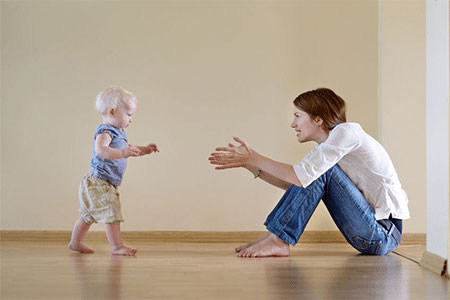
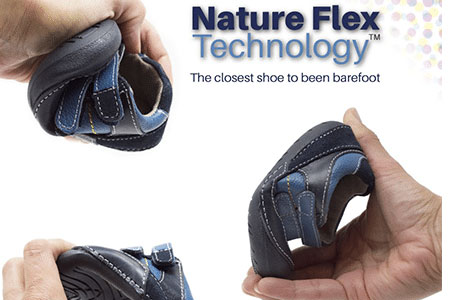
Hello, my daughter has pronating feet, instability, weak ankles, and wobbly when walking. it’s inherited as Mother was the same way. Overwhelmed at options. She walks but not sturdy nor far. What do you recommend for shoes? I bought the stride right grayson booties and also the New Balance sneaks- are either of these correct?
Hi Jay,
How old is your daughter? The Stride Rite Grayson is a great choice to help treat the issues you mentioned.
As far as the New Balance sneakers concern, I need to know which specific style you got for your daughter.
Any shoe recommendations to deter tip toe walking?
Hello Lili,
If you provide me with your child’s shoe size (length and width), I will provide you with a selection of the best shoes for a child that is walking on his or her toes.
Thank you so much for this very informative article! We have been confused about what to buy for our twin girls who are starting to walk, and you explain all of the considerations so well here. There is no other site like yours, and we are big fans, so keep up the good work!
Hello Obdulio,
I hope your daughters are taking their first steps with confidence in their new shoes. Thank you for sharing!